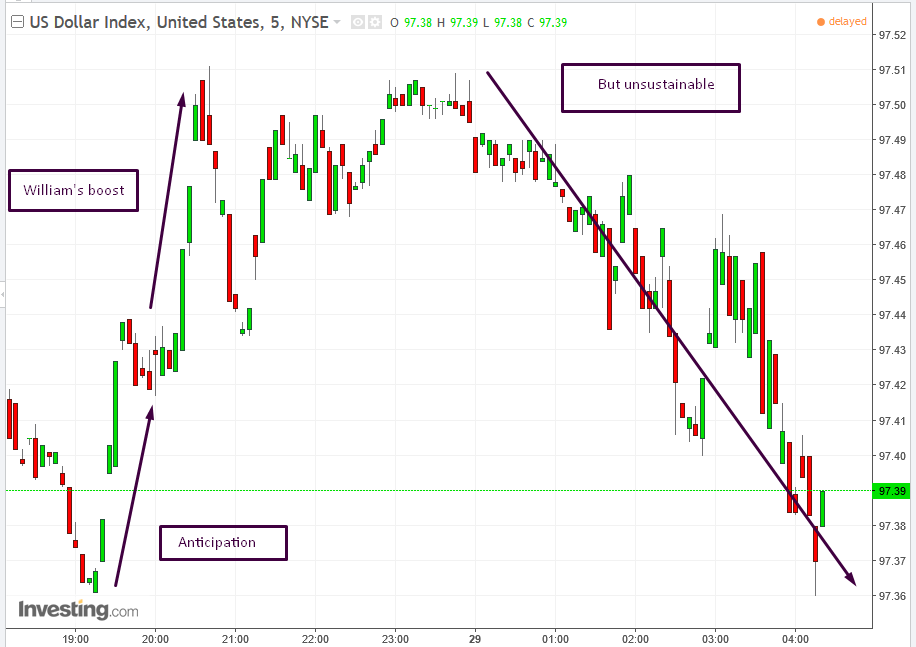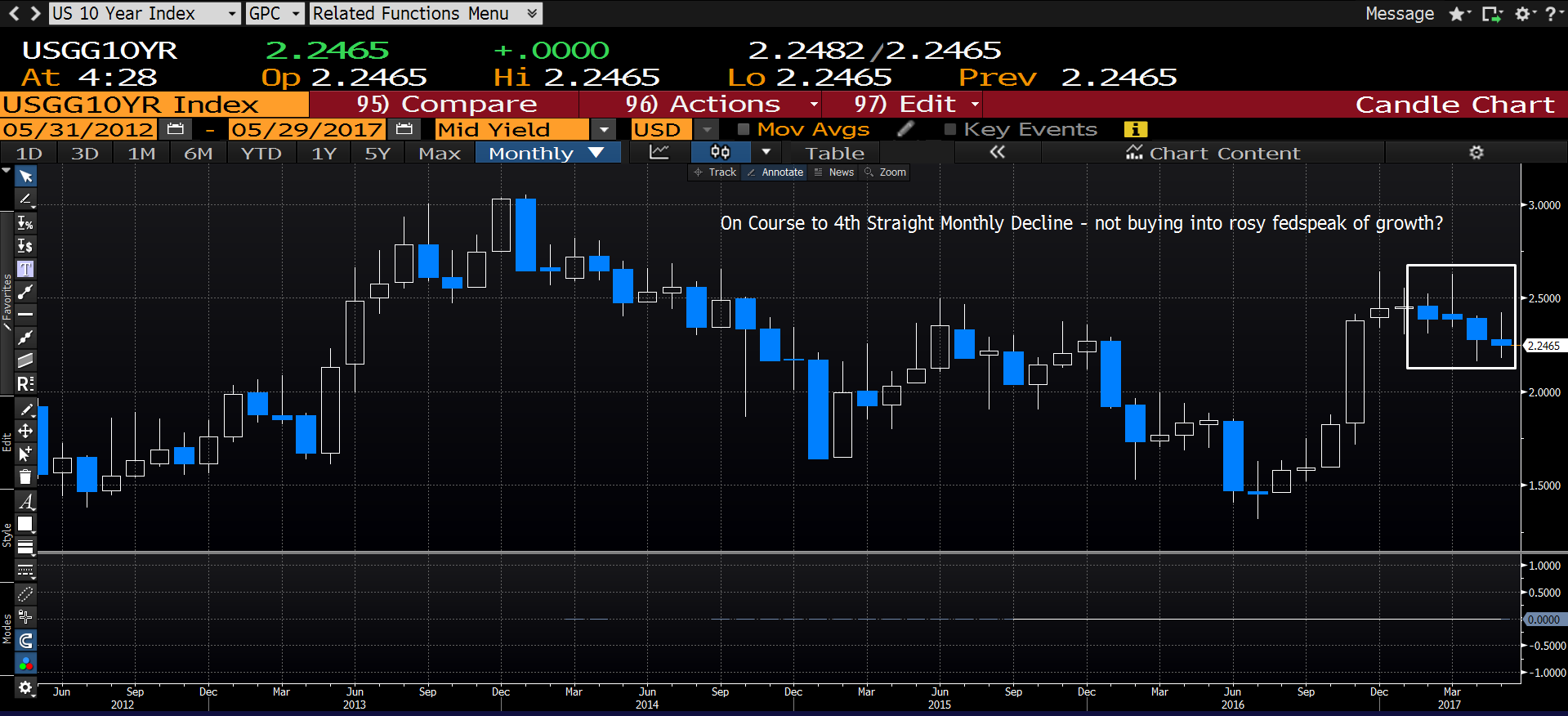by Pinchas Cohen
- US, UK, Chinese and Taiwan markets all closed today for holidays.
- Early-bird-traders took advantage of low volume and drove stocks up, then cashed out. Global markets now are mixed.
- Yen – the new risk gauge and new dollar gauge – is pinned down, as traders can’t seem to translate recent fedspeak on interest rates and the economy into action.
Equity and debt traders appear to be in a of tug-of-war. On the one hand, over the past six weeks, stocks have pushed higher to new records. This suggests that equity markets at least, believe that global economic growth can absorb higher interest rates—even as early as next month—while moving past US President Trump’s political scandals and the ever-receding likelihood that he can deliver on his pro-growth agenda.
On the other hand, U.S. 10-Year Treasuries are on their fourth monthly rise, fueled by concerns that inflation is disappointing expectations. It would appear that bond traders aren’t buying what Federal Reserve Bank of San Francisco President John Williams is selling when he says that the economy is strong enough to absorb three or even four rate hikes during the course of the second half of the year.
Note that while he doesn’t have a vote on monetary policy this year, he worked closely with Fed Chief Janet Yellen when she was President of the SF Fed, so, he knows how she thinks and may well have her ear. And, yet, there is a narrative among some traders that the FOMC minutes, released last week, revealed a cautious Fed, after the 1Q slowdown (despite Fed Governor Lael Brainard’s emphasis that the global economic outlook is the brightest in years).
Perhaps too, bond traders aren’t sold on global economic growth, following the first indications of a possible Chinese slowdown. Recent data, capped by last week's surprise debt rating downgrade by Moody’s—the first for China in almost a decade—may reflect a reversal of animal spirits. Or perhaps it's just investor optimism, which went wild in the first half of the year, but has been dampened by China's government crackdown on leverage which rendered domestic borrowing more expensive; a decline in confidence among small and medium-sized companies, as well as among sales managers and the steel market.
Not all is doom-and-gloom however. Consumers are still spending, factory-gate prices gaining and home prices continue to defy ominous forecasts.
The bear argument includes a negative divergence between rising prices and lowering breadth, on top of potential complacency, onmulti-decade low VIX readings, on top of high earnings multiples.
This Week’s Events

- Fedpseak continues this with Lael Brainard and Patrick Harker. Williams' comments gave the dollar an 86-pip boost to 97.516 between 20:20 and 20:35 EDT, but the dollar didn’t have the stamina to continue higher and returned all its gains and then some, declining further. Brainard’s and Harker’s comments may reinforce Williams' remarks, which could therefore strengthen the dollar even more. On the other hand, they could say something that traders will interpret differently and add to their confusion, thereby increasing volatility, the bread-and-butter of short term traders.
- European Central Bank President Mario Draghi speaks to the European Parliament on Monday. Some traders may think that he's already said all there is to say in his dovish Madrid presentation last week. Traders, beware that in the past, on occasion, he's balanced an earlier delivery by emphasizing contrary points, sending the single currency in the opposite direction as a result
- Chinese data on manufacturing and and services industries will be released May 31.
- The monthly U.S. jobs report will be released June 2.
Stocks
- The Stoxx Europe 600 Index fell 0.1 percent as of 8:33 a.m. in London. The MSCI Asia Pacific Index lost 0.1 percent, with almost an equal number of shares rising as falling.
- Japan's TOPIX advanced less than 0.1 percent. Australia’s S&P/ASX 200 Index fell 0.8 percent. Hong Kong's Hang Seng increased 0.3 percent and the Hang Seng China Enterprises Index rose 0.4 percent. Chinese developers extended Asia’s biggest rally this year, with China Evergrande Group (HK:3333) surging to a record in Hong Kong.
- South Korea's KOSPI fell 0.1 percent after jumping 0.7 percent earlier in the day. The index closed last week at an all-time high. North Korea conducted another ballistic missile test over the weekend, just days after world leaders urged Kim Jong Un to abandon his nuclear weapons program.
Currencies
- The yen was little changed at 111.30.
- South Africa's rand was was little changed after erasing a gain of 1.8 percent. Pressure had built on South African President Jacob Zuma to quit following his March 31 decision to fire Pravin Gordhan as finance minister in a cabinet reshuffle, a move that sparked public protests and cost the country its investment grade credit rating.
- China's offshore yuan rose 0.1 percent, stretching a rally to its fourth day amid suspected intervention from the People’s Bank of China and surging funding costs in Hong Kong.
Bonds

- The yield on U.S. 10-year Treasuries was 2.25 percent at the end of last week. The Treasury-note is now two days away from a fourth consecutive monthly decline.
